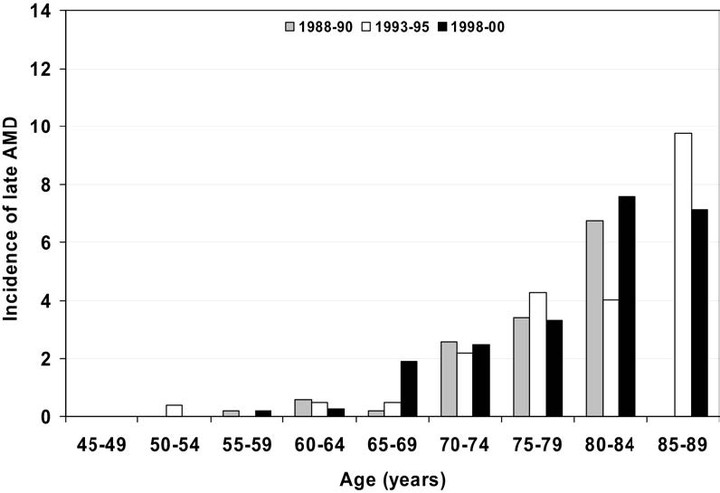Age-period-cohort effect on the incidence of age-related macular degeneration: the Beaver Dam Eye Study

Abstract
OBJECTIVE: To examine relationships of age, period, and birth cohort with the 5-year incidence of age-related macular degeneration (AMD). DESIGN: Population-based cohort study with 4 examination visits 5 years apart from 1988 through 1990, 1993 through 1995, 1998 through 2000, and 2003 through 2005. PARTICIPANTS: Two thousand nine hundred sixty-eight persons (6603 participant visits) and 3588 persons (8184 participant visits) 43 to 86 years of age at baseline contributing to the incidence of early and late AMD, respectively. METHODS: Grading of stereoscopic fundus photographs using the Wisconsin Age-Related Maculopathy Grading System. MAIN OUTCOME MEASURES: Five-year incidence of early AMD. RESULTS: While controlling for age, there was a lower 5-year incidence of early AMD in later rather than in earlier birth cohorts (odds ratio per increasing category, 0.70; 95% confidence interval, 0.62-0.78; P<0.001). This remained while controlling for smoking, blood pressure, and other related factors. There was no evidence for a period or birth cohort effect with late AMD. CONCLUSIONS: Lower incidence of early AMD in more recent birth cohorts is likely the result of unmeasured risk factors for early AMD. Further study of possible unmeasured risk factors that may have caused this cohort effect may help to identify new modifiable risk factors for AMD. Diminishing incidence of early AMD in later birth cohorts would be expected to result in lower long-term estimates of future incidence of AMD than do current estimates that do not take this effect into account.